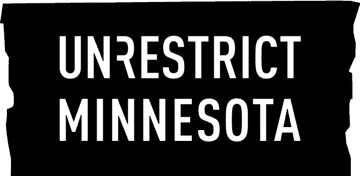As a community-supported public awareness campaign, UnRestrict Minnesota is driven by the solidarity and leadership of its community partners. Together, these advocates, health care providers, lawyers, union members, artists, and concerned citizens are advancing every Minnesotan’s right to access abortion care in our state.
Located in Duluth, Minnesota, the H.O.T.D.I.S.H. Militia (Hand Over The Decision It’S Healthcare) exists to ensure reproductive freedom, body autonomy and abortion access for all people in the Northland. To accomplish this goal, the Militia provides financial support, promotes community education, and engages in political action, blending the regional culture of northern Minnesota and Wisconsin with political theory, practice, and grassroots organizing, while intentionally approaching reproductive health and justice in a regionally-specific way.
Q&A
Below, educator, artist, organizer and co-founder of the H.O.T.D.I.S.H. Militia Erin O’Daniel shares the Militia’s deep connections to its region and the importance of collaborative and collective organizing in the Militia’s work.
Could you tell us a little bit about your work?
The H.O.T.D.I.S.H. Militia is an abortion fund located in Duluth, Minnesota—we actually just celebrated our twentieth birthday! We were formed on the day that Paul Wellstone died. I had just moved to Duluth and I was at an organizing conference; we had just sat down to lunch on the second day of this conference, and many of the people in the room had worked closely with Paul and Sheila (Wellstone). I was 25 at the time, and I had been doing reproductive justice work for a while, and though I was new to Duluth, I saw what Paul and Sheila had lent to the larger landscape of organizing work through the grief and resilience of the community members who had known them. I was really aware of the power in that room and didn’t want to let it go. So as the conference was ending, I asked the lead organizer, what’s the one issue where we can channel this power? She didn’t hesitate. She said, “Reproductive health and reproductive justice.”
So I gathered people’s contact information and that’s how we began. There have been a lot of powerhouse organizations that have come out of Duluth, and we were able to connect in a very grassroots way with people who have been doing this work for a long time. The next year, we hosted our first H.O.T.D.I.S.H. bakeoff fundraiser, in part to raise funds for people to attend the March for Women’s Lives in Washington D.C. Around that time, I picked up an article by Jennifer Baumgardner that talked about abortion funds, and I had this realization that that’s what we were doing. We were raising funds for people to attend the march, but also to build access to abortion and this essential care. Through the bakeoff and through our name, we were using regional food culture to fund abortion and to build power towards reproductive justice. And that name—and literal hotdish!—has carried the Militia for twenty years.
Why is this work important to take on in Minnesota?
I’ll speak specifically to northern Minnesota and northern Wisconsin, though obviously we serve and reach a wide region. But from the beginning, northern Minnesota and northern Wisconsin was our focus. Part of the importance of our work is that it is extremely white in our region. Politically, many people identify as liberal-leaning or progressive, but for a lot of white people here, there isn’t movement beyond that identity. So for us, it’s been really important to bring the reproductive justice framework to this community here–to look beyond the everyday whiteness and white supremacy that is woven into our work, and to learn and uplift the work of Black, Brown, and Indigenous communities and queer and trans communities that have led in reproductive justice and pleasure activism. I also want to acknowledge that the Militia itself has been predominantly white in its leadership, event attendees, and community members. So our work also involves examining our own complicity, recognizing the advantages afforded by whiteness while doing this work, and pursuing something different. And that’s why our work is important. Our roots in northern Minnesota, our partnership with WE Health, our position as one of the smallest abortion funds in the country–all of these assets equip us to do radical work that is grounded in, and informed by, our region.
Why did you join the UnRestrict Minnesota coalition?
We pride ourselves in Minnesota as being a fairly progressive state, and yet these restrictions on abortion access existed for so long. We joined the UnRestrict Minnesota coalition because the Militia is really effective in collaborative work. We know that when we work together and in community, we can do more comprehensive work. For example, the relationship that we have with WE Health and our partnership as part of the UnRestrict Minnesota coalition has connected us to people in the Metro and other folks doing really good work in organizing, education, advocacy, and legislation. The H.O.T.D.I.S.H. Militia was birthed out of movement work. UnRestrict Minnesota is movement work. Without that recognition of movement and networked support, sometimes we can forget that we are a part of something connected to each other.
What is your vision for achieving full reproductive justice in Minnesota?
One of the things we struggle with professionally, creatively, and personally in Minnesota and in Duluth is that reproductive justice is often pushed aside in conversations about white supremacy and harm, even in communities where people pride themselves on being very progressive. So I think that’s my vision—a vision where reproductive justice is lifted up, and is a part of everyone’s reality and part of every community. To me, full reproductive justice means that people are advocating, organizing, creating around reproductive justice in ways that we have around other social justice issues. That translates to easier access, easier points of conversation, stronger and more equitable health outcomes, body autonomy for everyone, and a different relationship to pleasure.
Culture dictated by colonization and white supremacy holds a pervasive silence and shame around pleasure and care. And until we openly address that and what that means for Black and Brown folks, queer and trans folks—unless we follow the lead of the phenomenal Black and Indigenous organizers, organizers of color, and queer and trans organizers who have been working towards reproductive justice for generations—we won’t be truly doing the work that so many of us dream of doing together.
How can people get engaged with your work?
Financial support is always welcome, and we also welcome new members to the Militia. And also talk with your communities. People are often asking what they can do. Our capacity waxes and wanes with the folks who are at the table; we are a small fund and a small collective, and we don’t have the time and energy to teach people about why we fund abortion, why we do our work, why we advocate for reproductive justice. So one of the biggest ways that people can engage is to learn! To read, talk with other people, write, make art, throw some new shit out there. That’s how we move together.


